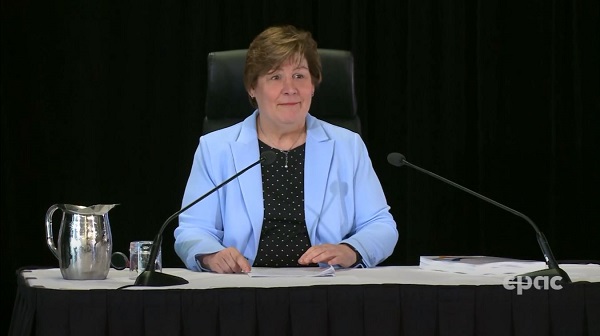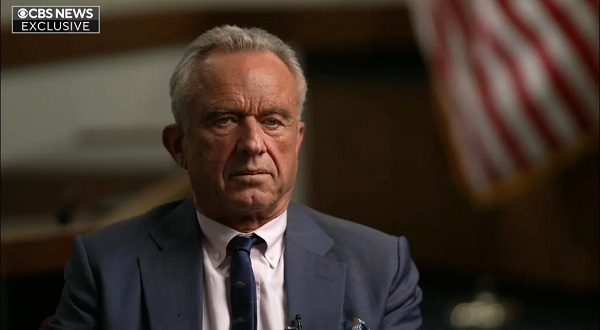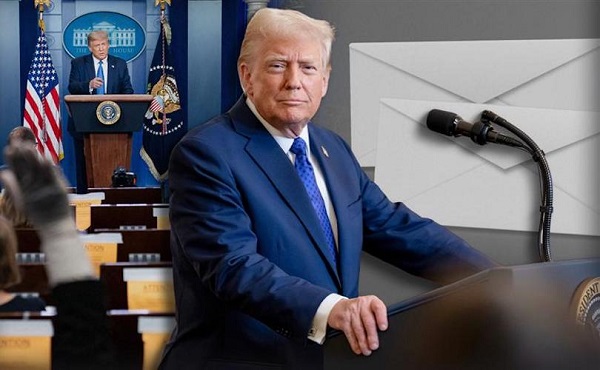espionage
Breaking: Hogue Commission Will Hear From New Safety-Protected Witnesses On PRC Targeting of Chinese Candidates

Hogue Finds Witnesses Face Credible Threats, Records Will Be Sealed for 99 Years
In an extraordinary move, Canada’s foreign interference inquiry will hear testimony from two new secret witnesses with firsthand knowledge of the People’s Republic of China’s influence operations targeting electoral candidates and community associations in Canada. Commissioner Marie-Josée Hogue announced the decision today, weeks after the public testimony phase concluded, revealing that the witnesses—identified only as Person B and Person C—face credible threats to their safety and that of their families due to their insights into how Beijing’s United Front Work Department (UFWD) targets Chinese Canadian politicians and community associations.
The witnesses’ identities and testimonies will be closely guarded, with only sanitized summaries made available to the public and participants. According to Hogue’s decision, Person B has provided critical insight into the UFWD’s tactics, describing how Beijing’s agents “co-opt and leverage some Chinese Canadian community associations and politicians of Chinese origin” to advance PRC interests. Much of Person B’s information is firsthand, Hogue’s decision states, suggesting the witness could produce explosive evidence relevant to high-profile cases under examination for Hogue’s final report in December.
Both witnesses expressed profound concerns about the consequences they could face if Beijing discovered their identities. Person C, in particular, described the likelihood of “threats to their physical safety, intimidation and harassment by PRC officials or sympathetic community members in Canada, and the potential loss of their employment” should their cooperation with the Commission become known. Person B similarly voiced fears of “serious repercussions,” including community ostracization and job loss, if their identity were disclosed. “This fear is based, in part, on the fact that the PRC and its United Front Work Department has infiltrated some Chinese Canadian community associations,” Hogue’s decision states.
In light of the witnesses’ statements and intelligence on PRC activities, Commission counsel deemed the witnesses’ concerns “credible.” Commissioner Hogue emphasized the necessity of these safety measures, stating, “I am satisfied by the information contained in the application that the fears expressed by Person B and Person C are not only credible, but also compelling. In light of other information that the Commission has received about the tactics of the PRC, including transnational repression, I am satisfied that the concerns expressed by Person B and Person C are reasonable.”
The extraordinary protective measures will allow the witnesses to provide their statements confidentially via affidavits, sealed for 99 years, marking an exceptional step to protect those revealing sensitive information on state actors. Commissioner Hogue further elaborated that the witnesses’ evidence is crucial to understanding the extent of Beijing’s operations in Canada but could not be accessed without protective guarantees.
Hogue’s decision marks a rare departure from standard inquiry practices, reflecting what she described as Canada’s duty to protect those who risk their safety to expose foreign influence.
Duff Conacher of Democracy Watch, which has made submissions seeking the disclosure of cabinet-protected documents in the Commission, said he welcomes the Inquiry’s decision to hear from important new witnesses.
“It’s good to see the Inquiry continue to gather evidence about foreign interference activities, especially given that its hearings in the spring and fall left many questions unanswered, mainly because the Inquiry called witnesses mostly from government and political parties who have an interest in covering up interference, loopholes, and weak enforcement,” he said.
But Conacher reiterated his reservations about the overall lack of transparency in the Commission’s proceedings and what he calls loopholes in Canada’s laws against foreign influence.
“The only way to stop foreign interference is to effectively prevent it, and it will only be prevented by closing huge loopholes in laws across Canada that allow for secret, undemocratic and unethical spending, fundraising, donations, loans, lobbying, and disinformation campaigns by foreign ‘proxies,’ and by strengthening enforcement and penalties,” he said. “Hopefully, the Hogue Inquiry will strongly recommend closing all these loopholes and strengthening enforcement and penalties.”
The Bureau is a reader-supported publication. To receive new posts and support my work, consider becoming a free or paid subscriber.
2025 Federal Election
Researchers Link China’s Intelligence and Elite Influence Arms to B.C. Government, Liberal Party, and Trudeau-Appointed Senator

 Sam Cooper
Sam Cooper
“The PRC uses its UFWD in Canada and around the world to stifle criticism and manipulate Canadian communities. These activities constitute a threat to Canada’s sovereignty and to the safety of Canadians.”
A powerful new investigative map released by diaspora researchers traces political ties reaching from Chinese Communist Party-controlled intelligence networks to the highest levels of British Columbia’s government. The visual exposé centers on Senator Yuen Pau Woo and his pivotal role in welcoming Chinese state-linked entities into Canadian institutions—an effort that resonates in a secretly recorded 2020 meeting obtained by The Bureau, in which Woo assured United Front figures he would help shield them from critical scrutiny.
These same United Front entities have been credited by Beijing for their role in promoting Chinese Canadian candidates during federal election campaigns.

Woo was appointed to the Senate by Prime Minister Justin Trudeau in 2016, with an official announcement citing his work with the same entities now identified by diaspora researchers as Chinese-influenced trade lobbies.
The map, titled “From Ottawa to Victoria,” is part of the ongoing Dotting the Map series from Canadian Friends of Hong Kong and Found in Translation, two diaspora-led civil society groups. Built from open-source records, the map draws direct lines between United Front-aligned business, political, and media organizations and prominent Canadian leaders, including Senator Woo, former BC Liberal Premier Christy Clark, ex-minister Teresa Wat, Premier David Eby’s advisor Ding Guo, and Rise Media journalists.
The researchers caution that no individual named in their report is alleged to be knowingly involved in Chinese influence activities. Rather, the mapping effort is designed to educate voters by highlighting verified affiliations to Chinese state or military-linked organizations.
Rise Media—as reported by The Bureau—played a key role in supporting Mark Carney’s current Liberal candidate Parm Bains in the 2021 contest, in which Bains upset Conservative incumbent Kenny Chiu. That Richmond riding is one of the top three examples of Chinese election interference overturning Conservative candidates, according to former Conservative leader Erin O’Toole.
At the center of the new Dotting the Map diagram is Senator Woo, shown helping open pathways for China Poly Group, a state conglomerate tied to the People’s Liberation Army, and Poly Culture, its cultural diplomacy arm. The map shows that under the Liberal Christy Clark government—with Woo’s active involvement—British Columbia approved multi-million-dollar partnerships with numerous shadowy Chinese entities via HQ Vancouver, a Canadian “public-private” entity created to draw foreign investment into Canada.
Woo’s name is also linked through board roles and event partnerships to the Asia Pacific Foundation of Canada and various CCP-aligned think tanks, including those tied through joint programming to the International Liaison Department, a CCP foreign intelligence arm.
According to the map, Woo co-organized a 2010 event in Canada with Henry Huiyao Wang, founder of the Centre for China & Globalization—a think tank under the ILD that directly advises the Chinese State Council. Wang and Woo co-wrote articles and maintained overt links through the Asia Pacific Foundation during Woo’s tenure as president and CEO.
According to political scientist Anne-Marie Brady, the ILD is “tasked with gathering intelligence on foreign politicians and political parties, and developing asset relations with them.”
In Justin Trudeau’s October 2016 appointment notice, Woo is credited for works including:
“As President and CEO of the Asia Pacific Foundation of Canada from 2005 to 2014, he led a major expansion of the organization and spearheaded the ‘National Conversation on Asia’, a three-year cross-Canada campaign to highlight the growing importance of Asia in the world and for Canada. Currently, he serves as President of HQ Vancouver, a public-private partnership established to promote British Columbia as a head office location for global firms.”
According to the map, Teresa Wat, while serving as a minister in Christy Clark’s Liberal government, extended Belt and Road cooperation to British Columbia, joined Huawei and a local telecom firm in 5G research initiatives, participated in multiple PRC-affiliated delegations, and came from a background in Chinese state-linked media. She is also listed as having facilitated the involvement of Chinese real estate tycoons in provincial-level discussions on infrastructure and housing.
The map identifies Ding Guo, founder of the Canada Committee 100 Society (CCS100), as a critical node. Guo is shown as a journalist from Shanghai who transitioned into a leadership role in B.C. Chinese-language media and political mobilization.
As previously reported by The Bureau, in December 2021, then-Attorney General David Eby approved a $20,000 provincial grant to CCS100, citing its anti-racism and Chinese diaspora engagement goals. The grant was awarded while Guo served as a Chinese community advisor to Eby. A February 2021 report from a Chinese Communist Party organ cited CCS100 among several Canadian groups praised for “voter education, mobilization, and fundraising” efforts during the 2019 election cycle.
Premier Eby also awarded Ding Guo the King Charles III Coronation Medal, the researchers found.
Kenny Zhang, also named in the map, is shown occupying a dual role as a former executive director of HQ Vancouver and head researcher with Ding Guo’s CCS100. He was affiliated with Rise Media, which promoted Liberal candidate Parm Bains over MP Kenny Chiu during the 2021 federal election campaign—and Zhang was also awarded a King Charles III Coronation Medal by Senator Yuen Pau Woo.
The Bureau’s publication of the “Woo Tape” forms part of the evidentiary spine of the researchers’ latest map. All three—Ding Guo, Kenny Zhang, and Senator Yuen Pau Woo—were present in this groundbreaking piece of evidence.
In the May 2020 recording, Senator Woo tells CCS100 leaders, including Ding Guo, that he will help protect their organizations from scrutiny in Canadian public discourse, including inside Parliament.
The remote-online meeting, captured on audio and visual files held by The Bureau, included figures tied to United Front-linked institutions and media outlets aligned with PRC narratives. In the meeting, Woo states: “Whether you belong to an organization, that happens to be listed as a United Front organization, should not be a litmus test.”
He continues: “I am fighting very hard,” against this type of criticism.
The statements closely mirror the PRC’s own foreign messaging, which frequently defends its overseas political networks as benign civic or cultural organizations.
When The Bureau sent detailed questions to Senator Woo regarding the recording, Woo advised that questions should be directed to the Hogue Commission.
The Bureau also provided the tape-recorded evidence to CSIS and asked the Service to comment on whether the statements are relevant to Woo’s intervener status in the Hogue Commission.
“Individuals purposefully aligning themselves with United Front Work Department (UFWD) designated organizations should understand its ongoing actions targeting members of Canadian communities with harassment, manipulation or intimidation,” spokesman Eric Balsam wrote, in a statement that didn’t name Senator Woo. “The PRC uses its UFWD in Canada and around the world to stifle criticism and manipulate Canadian communities. These activities constitute a threat to Canada’s sovereignty and to the safety of Canadians.”
The researchers’ findings—meant to educate voters during a Canadian election in which Prime Minister Mark Carney has already been boosted by disinformation from elite Chinese Communist Party intelligence entities—take on added significance in light of sections of the map that link Senator Woo, the Asia Pacific Foundation of Canada, and affiliated organizations to the International Liaison Department (ILD).
The ILD is a powerful arm of the Chinese Communist Party that experts identify as a covert influence and foreign intelligence agency operating globally on behalf of Beijing’s political interests.
In his 2022 book, Spies and Lies: How China’s Greatest Covert Operations Fooled the World, author and analyst Alex Joske details how the ILD has historically conducted clandestine activities aimed at shaping foreign perceptions and policymaking in favor of the CCP. His research shows that the department plays a central role in executing covert influence operations targeting political, business, and academic elites abroad.
Meanwhile, as previously reported by The Bureau, a report that praised Premier David Eby’s advisor Ding Guo for helping mobilize Chinese Canadian voters in 2019 also highlighted the importance of the Liberal Party leader’s outreach to the Chinese community in that contest. It noted that “Trudeau Jr. personally went to seek votes at a Chinese supermarket in Markham, an area of Toronto where Chinese people live, demonstrating that Chinese votes play an important role in the general election.”
The report, published by ACFROC (a United Front-linked organization), also emphasized the key role of WeChat in rallying voters. It said 41 federal election candidates seen as “of special interest” to Beijing were nominated by different parties in the 2019 race—an increase from “only 27 and 23 in 2015 and 2011.”
Charles Burton, a respected China expert and Mandarin-language analyst, reviewed the report for The Bureau. He said the document “identifies 41 ‘distinguished’ Chinese candidates nominated in 2019, so I judge that the use of ‘distinguished’ implies identification of candidates potentially useful to the United Front’s aims.”
The Bureau is a reader-supported publication.
To receive new posts and support my work, consider becoming a free or paid subscriber.
For the full experience, please upgrade your subscription and support a public interest startup.
We break international stories and this requires elite expertise, time and legal costs.
Invite your friends and earn rewards
2025 Federal Election
RCMP memo warns of Chinese interference on Canadian university campuses to affect election

From LifeSiteNews
The Royal Canadian Mounted Police singled out China as the only nation of interest, noting that the ‘threat posed by the People’s Republic and its powerful security and intelligence apparatus’ remains a ‘concern.’
An internal briefing note from Canada’s top police force warned that agents of the Communist Chinese Party (CCP) are targeting Canadian universities to intimidate them and in some instances challenge them on their “political positions.”
The December 3, 2024, memo titled On-Campus Foreign Interference from the Royal Canadian Mounted Police (RCMP) did not mention specific universities by name but noted that foreign interference was sophisticated and came solely from China.
The memo stated that as Canada’s academic institutions rely on “open, creative and collaborative environments” to foster independent debate, some “foreign intelligence services and government officials including the People’s Republic of China can exploit this culture of openness to monitor and coerce students, faculty and other university officials.”
“On university campuses foreign states may seek to exert undue influence, covertly and through proxies, by harassing dissidents and suppressing academic freedoms and free speech that are not aligned with their political interests,” the RCMP noted in the memo.
The memo noted that foreign agents’ influence in “public debate at academic institutions” may lead to them sponsoring “specific events to shape discussion rather than engage in free debate and dialogue.”
“They may also directly or indirectly attempt to disrupt public events or other on-campus activities they perceive as challenging their political positions and spread disinformation, undermining confidence in academic discourse and expertise,” the memo observed.
Notably, the memo singled out China, and thus the CCP, as the only nation of interest, noting that the “threat posed by the People’s Republic and its powerful security and intelligence apparatus including malign activities targeting our democratic institutions, communities and economic prosperity” remains a “concern.”
Some of the activities that foreign agents engaged included the recruitment of CCP sympathizers and “in some instances,” noted the memo, saw students be “pressured to participate in activities that are covertly organized by a foreign power.”
“Universities can also be used as venues for ‘talent spotting’ and intelligence collection in specific circumstances,” the memo stated.
The final report from the Foreign Interference Commission concluded that operatives from China may have had a hand in helping to elect a handful of MPs in both the 2019 and 2021 Canadian federal elections. It also concluded that China was the primary foreign interference threat to Canada.
According to hearings from a 2021 House of Commons Special Committee on Canada-China Relations, there were numerous documented incidents of CCP intimidation.
For example, a Tibetan Canadian, Chemi Lhamo, testified she got death threats after she ran for student council president at the University of Toronto’s Scarborough campus.
“There were comments saying the bullet that would go through me was made in China,” she said, noting that “Community members of the allied nations who are subjected to the Chinese Communist Party’s colonial violence are not alien to these tactics. We have witnessed China’s interference and influence not just in our university campuses but also in our communities.”
Earlier this week, LifeSiteNews reported that Canada’s Security and Intelligence Threats to Elections Task Force (SITE) confirmed the CCP government was behind an online “operation” on WeChat to paint Prime Minister Mark Carney in a positive light.
Canadians will head to the polls in a general election on April 28.
LifeSiteNews reported last week that the Liberal Party under Carney, has thus far seen no less than three MP candidates drop out of the election race over allegations of foreign interference.
LifeSiteNews recently reported how the Conservative Party sounded the alarm by sharing a 2016 video of Carney saying the Communist Chinese regime’s “perspective” on things is “one of its many strengths.”
As reported by LifeSiteNews, a new exposé by investigative journalist Sam Cooper claims there is compelling evidence that Carney and former Prime Minister Justin Trudeau are strongly influenced by an “elite network” of foreign actors, including those with ties to China and the World Economic Forum.
-

 2025 Federal Election2 days ago
2025 Federal Election2 days agoResearchers Link China’s Intelligence and Elite Influence Arms to B.C. Government, Liberal Party, and Trudeau-Appointed Senator
-

 Business2 days ago
Business2 days agoTimeline: Panama Canal Politics, Policy, and Tensions
-

 COVID-192 days ago
COVID-192 days agoFauci, top COVID officials have criminal referral requests filed against them in 7 states
-

 2025 Federal Election2 days ago
2025 Federal Election2 days agoPoilievre Announces Plan To Cut Taxes By $100,000 Per Home
-

 Health2 days ago
Health2 days agoRed Deer Hospital Lottery – Previous Supporter Draw Deadline!
-

 Health2 days ago
Health2 days agoRFK Jr. Shuts Down Measles Scare in His First Network Interview as HHS Secretary
-

 International2 days ago
International2 days agoTrump White House will ignore reporter emails that include ‘preferred pronouns’ in signature
-

 Bjorn Lomborg2 days ago
Bjorn Lomborg2 days agoThe stupidity of Net Zero | Bjorn Lomborg on how climate alarmism leads to economic crisis






